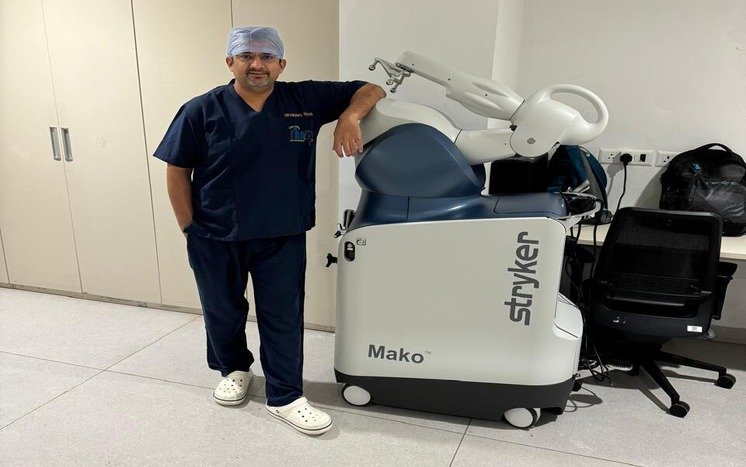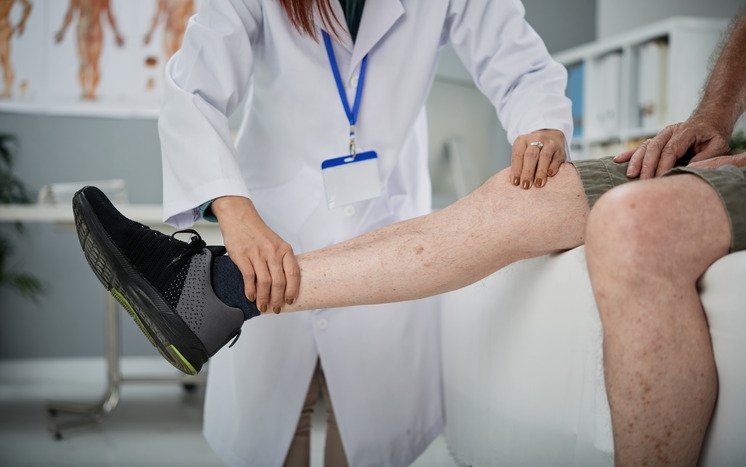 December 27, 2023
December 27, 2023
Navigating the Pre-Surgery Consultation with Your Joint Replacement Surgeon
Embarking on the journey towards joint replacement surgery involves a critical step: the pre-surgery consultation with your joint replacement surgeon. This consultation is more than a formality; it is a pivotal moment in your surgical preparation, ensuring that you are well informed, comfortable, and ready for the upcoming procedure. Let’s delve into the key aspects of this crucial appointment.
1. Understanding the Purpose of the Consultation:
The pre-surgery consultation is not just a procedural step but a fundamental aspect of your surgical journey. This is where the Joint replacement surgeon aims to achieve several essential objectives:
- Assessing Your Health: The consultation provides the Joint replacement surgeon with a comprehensive overview of your health. This includes evaluating your overall physical condition, considering the specific joint concerns, and identifying potential complications.
- Discussing the Procedure: It offers a platform for the Joint replacement surgeon to discuss the intricacies of the joint replacement procedure. This involves explaining the surgical approach, detailing the type of implant to be used, and outlining the potential risks and benefits associated with the surgery.
- Addressing Concerns: Importantly, the consultation is an opportunity for you to voice any concerns, questions, or uncertainties you may have about the upcoming surgery. The Joint replacement surgeon is there to address these apprehensions and provide the necessary reassurance.
2. Gathering Medical History:
One of the cornerstones of the pre-surgery consultation is the thorough gathering of your medical history. This step is crucial for several reasons:
- Tailoring Treatment Plans: Your medical history serves as a blueprint for the Joint replacement surgeon to tailor a specific treatment plan to your individual needs. This includes understanding any pre-existing conditions, chronic illnesses, medications you are currently taking, allergies, and details about past surgeries.
- Risk Assessment: By comprehensively understanding your medical history, the Joint replacement surgeon can assess potential risks associated with the surgery. This enables them to develop strategies to mitigate these risks and optimize your safety during the procedure.
3. Open Communication:
Open and honest communication is the bedrock of a successful pre-surgery consultation. Here’s why it matters:
- Building Trust: Establishing trust between you and your Joint replacement surgeon is vital. Open communication fosters a sense of trust, allowing you to feel confident in the care you will receive and ensuring that your concerns are acknowledged and addressed.
- Patient Empowerment: Encouraging patients to share their apprehensions, questions, or expectations openly empowers them in their healthcare journey. This dialogue creates an environment where you actively participate in decision-making and feel more in control of the upcoming surgery.
4. Discussing the Procedure:
Understanding the intricacies of the joint replacement procedure is a crucial aspect of the pre-surgery consultation:
- Surgical Approach: The Joint replacement surgeon will discuss the specific surgical approach for your joint replacement. This could include details about the incision, exposure of the joint, and any minimally invasive techniques that may be utilized.
- Type of Implant: The choice of the implant is a critical decision. The Joint replacement surgeon will explain the type of implant selected, considering material, size, and design factors. This choice is often tailored to your unique anatomy and the specific requirements of the joint.
- Risks and Benefits: Transparency about potential risks and benefits associated with the procedure is paramount. The Joint replacement surgeon will provide a detailed overview of what to expect, allowing you to make informed decisions about your healthcare.
5. Clarifying Expectations:
The pre-surgery consultation is an invaluable opportunity to clearly understand what the patient can expect throughout the surgical journey. This involves:
- Goals of the Surgery: The Joint replacement surgeon will articulate the specific goals of the joint replacement surgery. Whether it’s relieving pain, improving joint function, or addressing a particular condition, clarifying these goals helps align patient and surgeon expectations.
- Anticipated Outcomes: Patients should have a realistic view of outcomes expected from the surgery. This may include mobility improvements, pain reduction, and overall joint function enhancement.
- Expected Recovery Process: A transparent discussion about the expected recovery process is vital. This includes the duration of the recovery, milestones in the healing journey, and any lifestyle adjustments that may be necessary during this period.
6. Addressing Concerns and Questions:
An informed patient is an empowered patient. Encouraging individuals to come prepared with a list of questions and concerns fosters a collaborative and patient-centered approach:
- Empowering Patients: Patients are encouraged to express any uncertainties, fears, or inquiries about the upcoming surgery. This can range from details about the procedure to postoperative care and long-term expectations.
- Thorough Question-and-Answer Session: The Joint replacement surgeon plays a pivotal role in addressing the patient’s questions and concerns. Taking the time for a complete question-and-answer session ensures that patients feel heard, informed, and confident in their decision to proceed with the surgery.
7. Physical Examination:
A standard physical examination is a cornerstone of the pre-surgery consultation. This examination provides crucial insights into the patient’s current health and the specifics of the joint condition:
- Assessing Joint Mobility: The Joint replacement surgeon will evaluate the affected joint’s range of motion and mobility. This assessment helps understand the extent of impairment and guides surgical planning.
- Examination of X-rays: X-rays are often a part of the physical examination. They provide a detailed view of the joint’s structure, aiding the Joint replacement surgeon in visualizing the extent of damage and planning the surgical approach.
- Additional Tests: Additional tests may be conducted to gather more detailed information depending on the patient’s condition. This may include MRI scans, CT scans, or other diagnostic tools that comprehensively understand the joint’s health.
8. Diagnostic Tests:
Diagnostic tests play a pivotal role in enhancing the Joint replacement surgeon’s understanding of the joint condition and guiding the treatment plan:
- Blood Tests: Routine blood tests may be ordered to assess overall health and identify any underlying conditions that could impact the surgery.
- Imaging Studies: Beyond X-rays, imaging studies such as MRI or CT scans may be recommended. These studies provide detailed images of the joint, helping the Joint replacement surgeon in precise preoperative planning.
By actively engaging in a detailed physical examination and ordering relevant diagnostic tests, the Joint replacement surgeon gathers the necessary information to tailor the treatment plan to the patient’s unique needs. This comprehensive approach ensures the surgical strategy is personalized, addressing specific concerns and optimizing outcomes.
9. Discussing Alternatives and Risks:
Understanding that joint replacement surgery may not be the only option is integral to informed decision-making. During the consultation:
- Exploration of Alternatives: The Joint replacement surgeon will discuss alternative treatment options, considering the patient’s condition. This may involve less invasive procedures, lifestyle modifications, or medication management. Patients are encouraged to actively engage in this discussion to ensure that the chosen approach aligns with their preferences and lifestyles.
- Transparent Discussion of Risks: The Joint replacement surgeon will provide a candid overview of the potential risks of joint replacement surgery. This transparency empowers patients to make decisions based on a comprehensive understanding of the benefits and possible complications. The goal is to foster collaboration between the surgeon and patient in choosing the most suitable course of action.
10. Planning for Rehabilitation:
Postoperative rehabilitation is a pivotal phase in the joint replacement journey. The pre-surgery consultation acts as a starting point for this critical aspect:
- Emphasizing the Importance of Physical Therapy: Patients should understand that the success of joint replacement surgery is closely tied to postoperative rehabilitation. The Joint replacement surgeon will discuss the role of physical therapy in regaining strength, mobility, and overall joint function. This discussion lays the foundation for a proactive approach to rehabilitation.
- Tailoring Rehabilitation Plans: The Joint replacement surgeon will consider individual patient factors when planning for rehabilitation. This includes the intensity and duration of physical therapy and any specific exercises or modifications to accommodate unique patient needs.
11. Reviewing Preoperative Instructions:
Preparation for surgery goes beyond the operating room, and the pre-surgery consultation includes a comprehensive review of preoperative instructions:
- Medication Guidelines: Patients will receive guidelines on medications to be taken or avoided before the surgery. This includes any adjustments to existing medications and the use of pain management strategies.
- Fasting Instructions: Preoperative fasting is a common practice. The Joint replacement surgeon will provide clear instructions on when to stop eating and drinking before the surgery to ensure a safe and smooth procedure.
- Other Preparatory Measures: Additional preparatory measures may be discussed depending on the patient’s health and the specifics of the surgery. This could include skin preparation, hygiene guidelines, and logistical considerations for the day of surgery.
12. Addressing Financial and Insurance Matters:
Practical considerations, including financial aspects, are an integral part of the pre-surgery consultation:
- Insurance Coverage: The Joint replacement surgeon will discuss insurance coverage for the joint replacement surgery. Patients should be informed about what aspects of the procedure are covered and any potential out-of-pocket costs they may incur.
- Financial Implications: Understanding the financial implications of the surgery is crucial for patients. The Joint replacement surgeon or their support staff will clarify billing processes, payment options, and any potential financial responsibilities the patient may need to address.
13. Establishing a Rapport:
The relationship between a patient and their Joint replacement surgeon is more than a professional alliance; it’s a partnership built on trust and understanding. Here’s why establishing a rapport is crucial:
- Positive Surgical Experience: A trusting relationship contributes significantly to a smoother surgical experience. When patients feel comfortable with their Joint replacement surgeon, anxiety is alleviated, and the overall surgical journey becomes more manageable.
- Enhanced Patient Comfort: Feeling heard and understood by your Joint replacement surgeon fosters a sense of comfort. Patients are more likely to openly share concerns, ask questions, and actively participate in their care when a positive rapport is established.
- Communication Confidence: Establishing a rapport enhances communication between the patient and Joint replacement surgeon. This open line of communication is fundamental for addressing any evolving concerns or questions that may arise before or after the surgery.
14. Setting Realistic Expectations:
While joint replacement surgery can bring transformative results, it’s essential to set realistic expectations for the journey ahead:
- Insight into Achievable Outcomes: The Joint replacement surgeon will provide valuable insight into what can be realistically achieved through the joint replacement procedure. This includes improvements in mobility, pain reduction, and overall joint function.
- Timeline for Recovery: Setting realistic expectations involves understanding the timeline for recovery. Patients should be aware of the gradual nature of recovery, acknowledging that improvements may take time and consistent effort.
- Active Patient Involvement: Encouraging patients to participate actively in their recovery journey is part of setting realistic expectations. This involves following rehabilitation plans, attending follow-up appointments, and proactively maintaining overall joint health.
15. Follow-Up Plan:
The pre-surgery consultation is not a standalone event—it’s the beginning of an ongoing relationship. Discussing the follow-up plan ensures continuous support for patients:
- Information Dissemination: Patients should be informed about when and how they will receive additional information post-consultation. This may include written materials, digital resources, or access to educational platforms.
- Post-Consultation Questions: Patients should feel comfortable reaching out with any questions or concerns that arise after the consultation. Knowing the channels of communication and the expected response time enhances patient confidence and engagement.
- Scheduled Follow-Up Appointments: The Joint replacement surgeon will outline the schedule for follow-up appointments. These appointments are crucial for monitoring progress, addressing any postoperative concerns, and ensuring the recovery proceeds as planned.
In conclusion, the pre-surgery consultation is not just a singular event but the commencement of a collaborative and supportive relationship between the patient and Joint replacement surgeon. Establishing a rapport, setting realistic expectations, and outlining the follow-up plan contribute to a positive patient experience and successful joint replacement journey. Armed with knowledge and a sense of partnership with their Joint replacement surgeon, patients can approach the upcoming surgery with confidence and optimism.

 December 27, 2023
December 27, 2023




